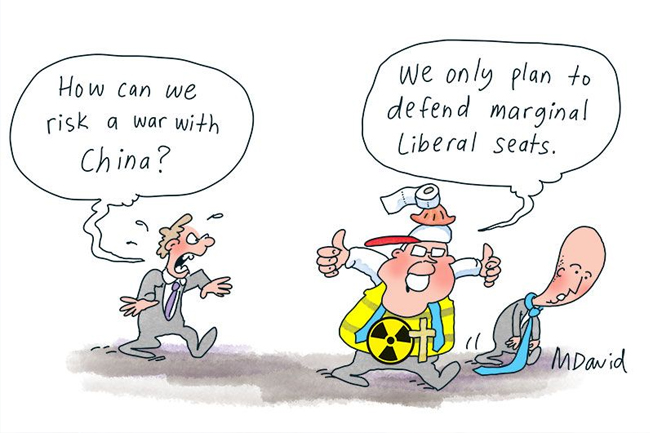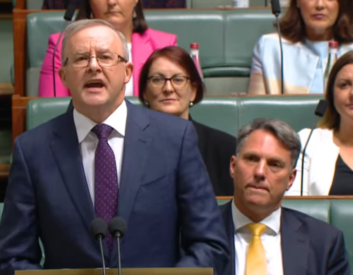Inequality is rising, but we can learn from an earlier, more egalitarian Australia and reclaim the "fair go", says Dr Geoff Davies.
INEQUALITY is increasing in the land of the "fair go", incomes are stagnant, our politics are puerile, and the people are surly and turned off.
Yet we Aussies have some remarkable accomplishments to our credit — some nearly forgotten. Perhaps it would do us good to be reminded.
The common version of Australia's history sells us short. Actually, it leaves out both the worst and the best of us. Some of our darker tales are slowly being brought to light, but some of the best parts of our story still lie largely dormant.
During the 19th Century, we accomplished an economic miracle, rising from near subsistence to being the wealthiest per capita in the world. As well, by 1900, we and New Zealand were the most socially progressive places in the world.
We certainly were not perfect. We were racist, as most were back then. Yet all white men had the vote and soon all white women had the vote. Women were still subordinate, but they had more say and more rights than almost anywhere in the world.
The eight-hour working day was soon instituted, along with a minimum wage, pensions and support for widows, among other socially constructive policies.
In 1910, the underrated Andrew Fisher won majorities in both houses of parliament and ended the early period of minority federal governments. His government made many advances, including building the rail link to Perth, rapidly expanding the armed services, and establishing a national currency, a bank, national library and art collections, and the national capital.
The egalitarian temper of the new nation was no accident. Colonial governments had been sensible enough to make small landholdings available so as to encourage gold diggers to stay and build the colonies. Agriculture rapidly mechanised and the country rapidly urbanised.
It was the combination of city workers and small landholders who resisted the efforts of the wealthy to establish a landed gentry. Had the latter succeeded, we might have gone the way of Argentina — a poor agrarian society with a tiny wealthy elite.
Early Federation Australia was a dynamic and progressive place. There was little cultural cringe. We had the most prolific movie industry in the world. We asked no permission as we set about giving everyone a fair go.
All of this was dealt a heavy blow by the First World War. On top of the trauma of heavy casualties, the conscription debate bitterly divided the nation. Gallipoli was not a glorious initiation of the young country; it was a bloody defeat that sapped the energy and spirit of Australia.
Australia’s egalitarian spirit was not extinguished but it struggled against the forces of wealth and empire thereafter. The prosperity of the post World War II era allowed some re-emergence of the tradition. Although Prime Minister Robert Menzies was nominally conservative, by today's standards his government was mildly social democratic.
It is a sad irony that the modern neoliberal era of selfishness and market fundamentalism was initiated by the Hawke-Keating Labor Government. Since then, inequality and economic instability have risen. Today, employment is insecure, many young people can no longer afford housing, government services are niggardly, household debt is extremely high and even our health is beginning to suffer from the stress of our fragmented and relentlessly competitive society.
It is a myth that the neoliberal restructuring ushered in an era of unprecedented prosperity. In fact, the economy has never matched its performance of the postwar decades.
It is also a myth that the economy of the 1970s was a basket case. The biggest problems were external. Oil embargoes quadrupled the price of oil and slowed all Western economies. The United States went off the gold standard and printed money to pay for its war in Vietnam, provoking inflation. Those problems would have been overcome without the deceitful neoliberal revolution that has done so much harm ever since.
We cannot recreate the world of the 1960s, but we can reclaim control of our own lives and Australia's affairs. We can control international money flows, we can jettison unconscionable trade deals that allow our lifeblood to be drained, we can invest in ourselves and we can again set about giving everyone a fair go.
The postwar decades were prosperous, because the government was not afraid to invest in enabling infrastructure, education and health, and because the resulting wealth was shared much more equally. Ordinary people spent their wealth back into the economy, whereas now the wealthy engage excessively in unproductive asset speculation.
Neoliberal apologists blame globalisation and automation for our current problems. However globalisation was engineered, and it can be substantially reversed. Automation has always been with us, the important question is: how we manage it. Do we allow it to enrich a few and throw many into unemployment, or do we ensure that everyone works less and enjoys more?
We can reclaim the fair go. We can live well and with much less social division. We would then also be much better able to address the big global challenges bearing down upon us.
Dr Geoff Davies is the author of Desperately Seeking the Fair Go (2017). He blogs at BetterNature and tweets at @BetterNatureOz.

This work is licensed under a Creative Commons Attribution-NonCommercial-NoDerivs 3.0 Australia License
Monthly Donation
Single Donation
Reclaim the fair go. Subscribe to IA.












